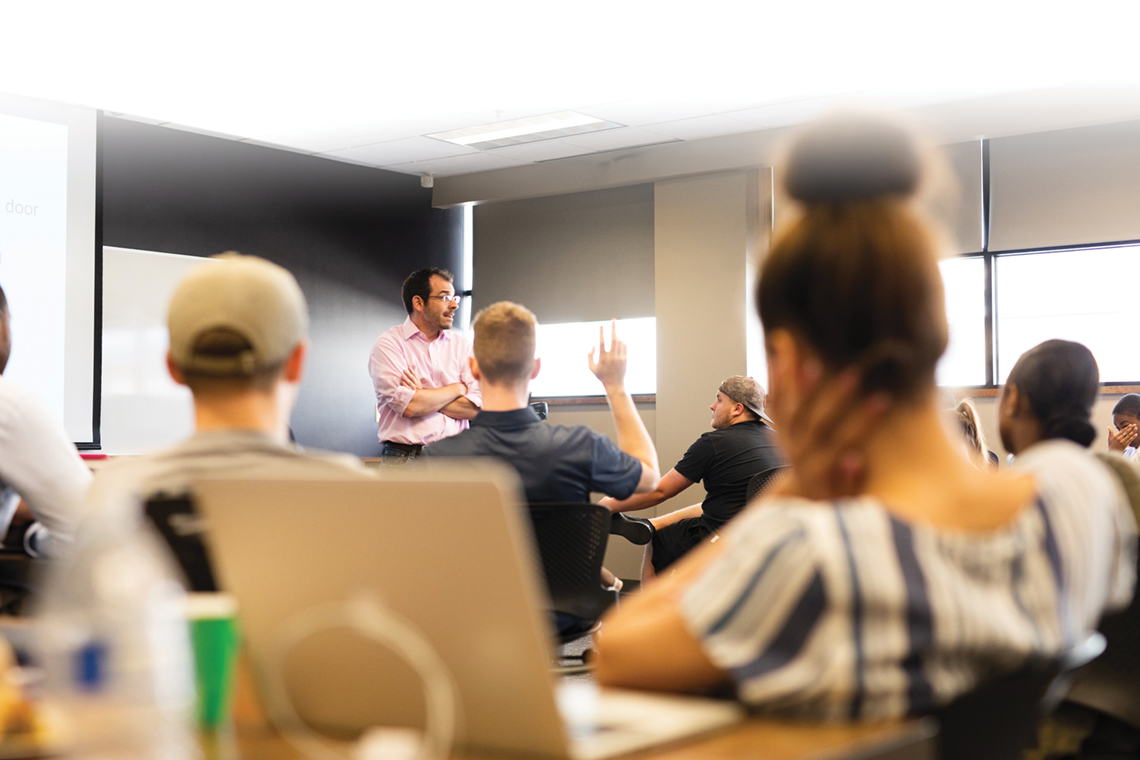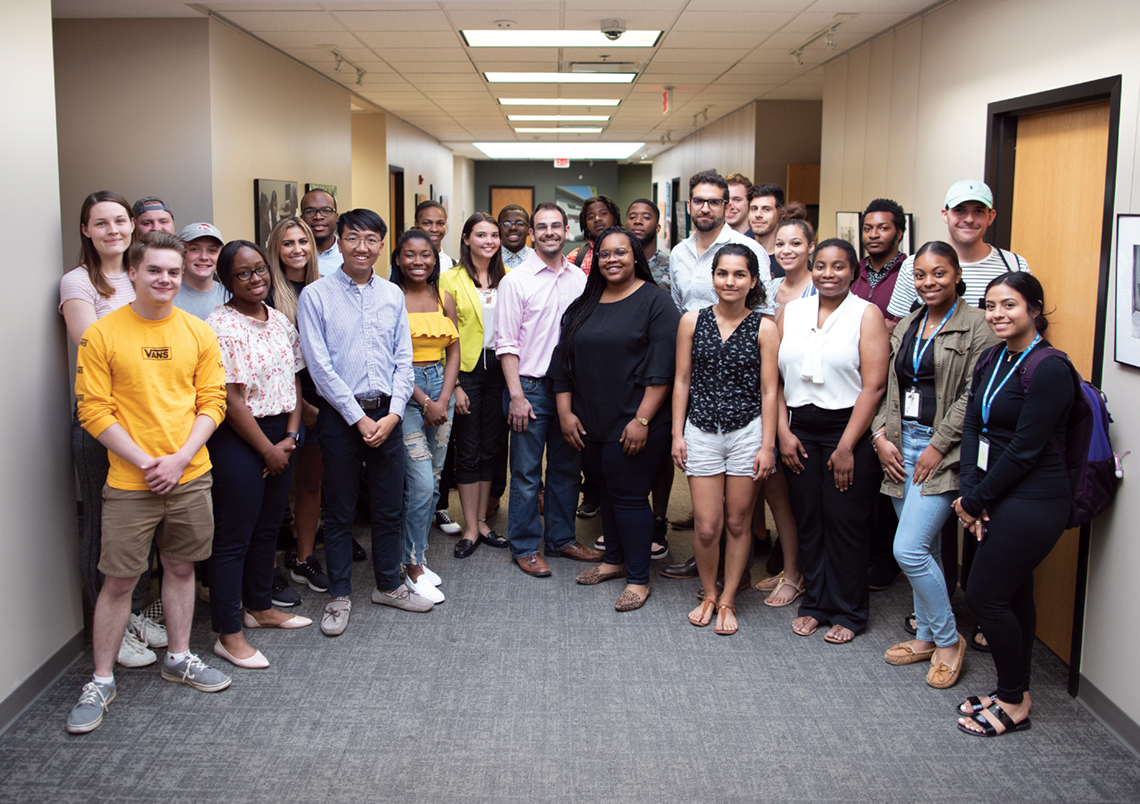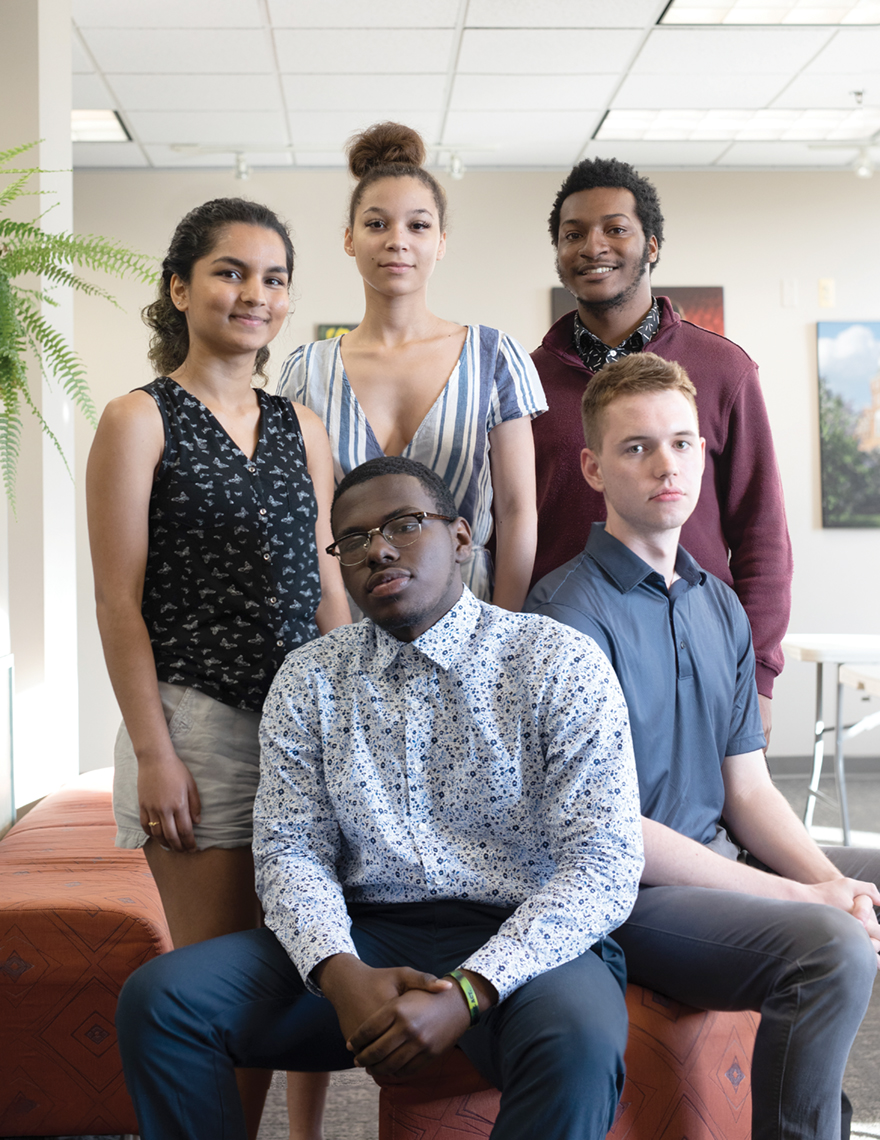When the Ordinary Becomes an Extraordinary Experience
The InnovateGov Summer Internship Program
- Joshua Sapotichne
- Associate Professor, Department of Political Science
- Director, InovateGov Program
- Director, Master of Public Policy Program
- College of Social Science

Political science instructor Marty Jordan leads a discussion about InnovateGov student experiences.
Campaigns usually hold all the glamour and glory of the political experience. Casual observers can get the idea that it's all intrigue and drama and scheming strategy, like what is portrayed on television. Think House of Cards or West Wing.
Just as misleading are light-hearted shows like Spin City or Parks and Rec. Are these the people who are running our government and making important daily decisions? Is every bureaucracy that quirky, every elected official that muddled?
As Josh Sapotichne knows, the seemingly mundane work of city government impacts nearly every aspect of people's lives. Government needs to run effectively to keep society functioning. Every elected office has laws and regulatory rules that outline the duties of the office, whether it's collecting taxes, managing schools, maintaining police and fire departments, or picking up trash.
Elected officials often try to change the rules to solve problems (fiscal or otherwise) more effectively or efficiently. That is when public policy impacts employees and citizens—sometimes for the better, and sometimes not. And when it's not working, it's anything but boring, or ordinary. Problem-solving at the government level requires skills such as innovation, creativity, and willingness to affect systems change. Sapotichne leads a program that aims to develop a talent pool of the next generation of transformational civic leaders in Detroit and beyond.
Sapotichne is an associate professor of political science who teaches and researches American public policy and urban politics. His recent work explores federal and state government approaches to urban issues and the challenges of governing an American city in an increasingly complex federal system. In 2009 he earned his Ph.D. from the University of Washington, and became an assistant professor at Michigan State University.
In 2015, Sapotichne published an MSU Extension white paper1, Beyond State Takeovers: Reconsidering the Role of State Government in Local Financial Distress, with Important Lessons for Michigan and its Embattled Cities. He and his co-authors (Erika Rosebrook, Eric A. Scorsone, Danielle Kaminski, Mary Doidge, and Traci Taylor) examined the crucial, but often overlooked, role of state governments in shaping the ways in which cities respond to financial difficulties. Among their findings: Michigan incubates financial stress among its local governments by imposing policies and legal structures that combine to make fiscal life hard for hundreds of local governments.
Detroit Mayor Michael Duggan was elected in November 2013, pledging economic development and financial recovery from the declared bankruptcy during summer 2013. His slogan, "Every neighborhood has a future," addressed his goal to include everyone in Detroit's turnaround.
It was an inspirational message for many, and Sapotichne took note.
The InnovateGov Program emerged from Sapotichne's belief that he and others at MSU could contribute toward building a thriving and equitable future for all Detroit residents. The message Detroit leadership was sending encouraged involvement. Sapotichne and Scorsone outlined a program that provided students with the opportunity to learn about public sector innovation by doing real work on real problems. For these young people, it's a one-of-a-kind opportunity to address some of the most challenging problems in Michigan's largest city.
There is also an equity issue.

Josh Sapotichne with the InnovateGov's 2019 cohort at the MSU Detroit Center during a weekly class meeting. "We want them to do it, feel it, and articulate what is going on. If it parallels with classroom discussion, can it help you relate to other people's experiences?" Sapotichne asked the students.
"Downtown Detroit is bursting with investment and energy, including new developments, pro sports stadiums, high-end retail, and hip coffee shops. Yet just blocks away, many neighborhoods continue to suffer the effects of a decades-long downward spiral. This duality—the tension between new ideas and the day-to-day experiences of residents—presents an immense challenge to the city's civic leadership," said Sapotichne.
According to recent research by Sapotichne and Sarah Reckhow, MSU political scientist and InnovateGov faculty co-leader in 2017 and 2018, Detroit has lost well over 50 percent of its government workforce in the last two decades2.
"They didn't need another white paper," said Sapotichne. "In 2014 there was a problem-solving attitude in City Hall that was taking shape. If you start by plugging holes—and if you can plug enough—you can begin to fill the void. Our program could provide one of the best resources we have—bright, enthusiastic, and energetic students. When we talked about the InnovateGov idea with the deputy mayor, Carol O'Cleireacain, she loved it."
InnovateGov was launched in 2015 and set out to place talented and motivated MSU students in Detroit's civic institutions, while providing those college students with a rare opportunity to do impactful and equitable work on the city's most critical social programs. Sapotichne and the team firmly believe in placing and supporting doers.
The program, now in its fifth year, accepted 26 students for summer 2019. The recruitment and admissions process deprioritizes traditional quantitative metrics of academic performance in favor of passion, drive, and diversity of experience. Since 2015, more than half of InnovateGov students are students of color. One-third are MSU Detroiters.
InnovateGov Program 2019 Community Partners
- Build Institute
- CitizenDetroit
- City of Detroit Office of Chief Financial Officer
- City of Detroit Department of Innovation and Technology
- City of Detroit Health Department
- City of Detroit Planning and Development Department
- City of Detroit Water and Sewerage Department
- Data Driven Detroit
- Detroit Economic Growth Corporation
- Detroit Future City
- Detroit Public Schools Community District
- Regional Transit Authority
- Third Judicial Circuit Court of Michigan
Students stay in Wayne State University residence halls for 10 weeks during the summer, take a project-based research/writing course and internship course credits, which together is commensurate with a 35-hour workweek. Students live in Detroit, work in Detroit, and each Friday the group participates in a cultural or recreational event or service project around the city.
The 2019 program team, led by Sapotichne, includes Kesicia Dickinson, a teaching assistant and doctoral student, and Dr. Marty Jordan, a political science instructor. Together, the team works with the interns to promote an immersive experience in Detroit, creating opportunities for students to interact with policymakers, community organization leaders, Detroit residents, and cultural institutions. They encourage students to challenge their own expectations about Detroit, about city government, or about urban policy issues.
"It's about facing the more challenging public problems facing American cities—in this case, Detroit—and learning to evaluate the various solutions that are proposed to address those problems," said Dickinson.
"We guide and educate students on the etiquette and social norms expected while working in a professional office environment," said Jordan. "For some, it's their first exposure to that type of environment."
"For other students," added Sapotichne, "they may already have a tremendous amount of knowledge and wisdom from growing up in Detroit and struggling with some of the issues that residents experience."
In five years, more than 160 InnovateGov interns from 22 different majors have participated in high-leverage placements in more than 30 Detroit civic institutions, among them the Mayor's Office, Data Driven Detroit, Detroit Public School Community District, and Detroit Future City, to name a few. Students work on a range of areas critical to the quality of life of Detroiters, addressing issues residents face on a daily basis: water shut-offs, mobility challenges, property vacancies, small business development, and many more. They provide the capacity and human capital necessary to tackle high-impact projects that touch every neighborhood in the city.
"The work that our students engage in is vital, and it makes a real impact on the lives of Detroiters," said Sapotichne.
Their efforts are getting noticed. The Quicken Loans Community Fund granted a $100,000 gift in April 2018 and last February, ITC Holdings Corporation, the largest independent electricity transmission company in the country, made a $100,000 donation to support the InnovateGov program. This support served as a catalyst for Dykema Gossett PLLC, Dykema Gossett's Energy Fund, and Zausmer, August and Caldwell, PC, to also contribute to the InnovateGov program.
"This is a resource-intensive program," said Sapotichne. "Our lead sponsors help provide long-term sustainability." The Department of Political Science and College of Social Science cover the costs of student housing, parking, and scholarships. Average student scholarships are roughly equivalent to the income of a summer-long paid internship.
In the weekly class sessions, Sapotichne, Jordan, and Dickinson tackle tough topics like gentrification, equitable revitalization, land-use and vacant property challenges, and transportation and mobility.
One of their first tasks is to form a brief explanation of their internship project deliverable, known as the "elevator pitch."
"Convey what the problem is and why you plan to spend your summer working on it. Back it up with information and data," said Jordan.
"How does it impact community?" asked Dickinson.
Students submit weekly reflections on their experiences. The instructors ask the students to go deeper than a recitation of facts. How does the experience differ from initial perceptions? The reflections should discuss the false perceptions and moments of realization alongside the work that is being done.
Sapotichne asks students to reflect on moments where they were uncomfortable, overwhelmed, or emotional about the responsibilities they were asked to handle.
"The classic academic problem is over-explaining it," said Sapotichne. "We want them to do it, feel it, and articulate what is going on. If it parallels with classroom discussion, can it help you relate to other people's experiences?"
One of the most important goals that Josh Sapotichne has for both the students and the organizations that work with the InnovateGov Program: "Ultimately, we want them leaving the organization a little better than what they found it," said Sapotichne.
Five Student Projects from InnovateGov's 2019 Cohort

Clockwise from top left: Samyuktha Iyer, Sydni Singler, Jerry Grant, Ian McGuire, and Jayson Law
Samyuktha Iyer, senior majoring in economics
Interning with the Land Use and Sustainability Team of Detroit Future City to play a key role in supporting several project deliverables for the Land + Water Works Program (LWW). The objective is to promote education about, and installation of, green stormwater infrastructure.
Sydni Singler, junior
Interning with the City of Detroit Water and Sewerage Department, assisting the lead team with communicating water main replacement projects with citizens, and analyzing, recording, and distributing water sampling to appropriate parties. Singler is passionate about community outreach and finding solutions to water shut-offs in homes to sustain livable housing for residents.
Jerry Grant, master's student in public policy
Interning with the Detroit Public Schools Community District to assist with a marketing and enrollment campaign, as well as the enrollment office's procedures and recruitment goals.
Ian McGuire, senior majoring in economics, with a focus on data analytics and sustainability
Working with Data Driven Detroit to explore the ethics of data-driven policymaking and problem-solving.
Jayson Law, sophomore majoring in political science and prelaw
Using a Skillman grant in his work with CitizenDetroit to write and design a citizen manual and teaching guide that engages youth and young adults in voter education and citizen participation.
Sources
- Sapotichne, J., Rosebrook, E., Scorsone, E.A., Kaminski, D., Doidge, M., & Taylor, T. (2015, August 31). Beyond state takeovers: Reconsidering the role of state government in local financial distress, with important lessons for Michigan and its embattled cities (MSU Extension White Paper). East Lansing: Michigan State University. Retrieved from https://www.canr.msu.edu/uploads/resources/pdfs/beyond_state_takeovers.pdf Back to Article
- Reckhow, S., Downey, D., & Sapotichne, J. (2019). Governing without government: Nonprofit governance in Detroit and Flint. Urban Affairs Review. Retrieved from https://doi.org/10.1177/1078087419847531 Back to Article
- Written by Carla Hills, University Outreach and Engagement
- Photographs courtesy of Khalid Ibrahim